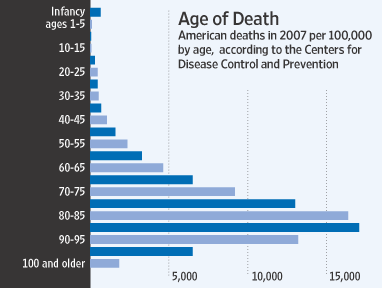
WSJ story on scientists claiming to be able to calculate longevity potential on the basis of studying very old people and discovering "a genetic signature of longevity."
Despite the great complexity of causality here, the lead researcher says "we can compute your specific predisposition to exceptional longevity." The academic researchers (Boston U) say they have no plans to profit from or patent the technology, and that a test will be made available on the Internet sometime in late July.
People want predictability in all things except the length of their life, where the vast majority prefer ignorance that allows maximum anticipation of possibilities.
There is a distinct difference between those who will die on the low end of the longevity spectrum and the "wellderly" who make it safely to old age and then face the prospect of 2-3 decades more life.
 One expert claimed that life insurance policies would be forever altered by such testing capacity, but for now, it requires a several-thousand-dollar layout to have your entire genome profiled. I guess insurance companies would need to posit their savings to justify the costs either picked up by them and made mandatory for granted coverage or forced upon consumers similarly.
One expert claimed that life insurance policies would be forever altered by such testing capacity, but for now, it requires a several-thousand-dollar layout to have your entire genome profiled. I guess insurance companies would need to posit their savings to justify the costs either picked up by them and made mandatory for granted coverage or forced upon consumers similarly.
What intrigues me more is the potential for genetic manipulation to "fix" what is missing. For example:
While a healthy lifestyle is paramount, such genetic factors appear to become more important the longer we live. Indeed, a variation in a single key gene called FOX03A can triple the chances a person may live past 100, researchers at the Pacific Health Research Institute in Hawaii recently reported.
How much would the average person be willing to pay to have FOX03A boosted?